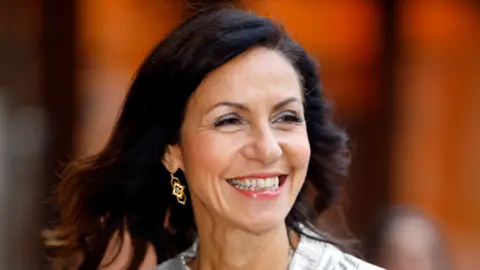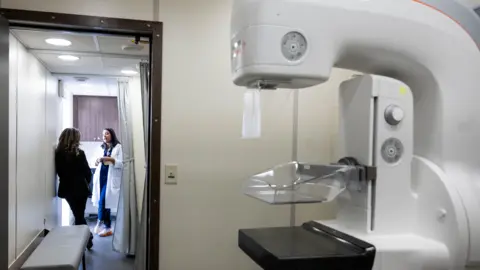Julia Bradbury praises breast cancer study
 Getty Images
Getty ImagesTelevision presenter Julia Bradbury has said a new study which concluded women with very dense breasts should be offered additional scans "could not come soon enough".
The 54-year-old, who was best known for presenting BBC One's Countryfile, was diagnosed with breast cancer in 2021 after a year and a half of tests.
A study led by the University of Cambridge said that other scans - not just traditional mammograms - could treble the number of cancers detected in these women.
"It is like looking for a snowball in a snowstorm, so this research could not come soon enough," Bradbury said.
Bradbury said she "found a lump" when she was travelling and got it checked.
After having a mammogram, Bradbury said she was "advised there was nothing to worry about".
"I was sitting in the chair about to leave the office with my consultant," she recalled.
"He said I am going to give you another ultrasound before you leave.
"Thank goodness I had that consultant."
Bradbury said a 6cm (2.4in) lump was found during the ultrasound, and she was sent for further tests.
"When I was having the biopsy I knew in my heart there was something seriously wrong, and those were the first tears I shed.
"I then had that horrible conversation of you have got cancer."
 Getty Images
Getty ImagesThe trial, co-ordinated from Addenbrooke's Hospital in Cambridge, tested different scanning methods on women with very dense breasts who had only been given a mammogram and had originally been told they did not have cancer.
More than 9,000 women were involved in the study.
About one in 10 women have very dense breasts and have a higher risk of developing breast cancer.
Researchers said the cancers were harder to spot as they look whiter on the X-rays, the same colour as early-stage cancers.
"I did not think there was anything untoward about having dense breasts. However, there is a slight risk of breast cancer," added Bradbury, speaking to the BBC this week.
'Fight cancer'
The Department of Health and Social Care said its screening advisory body had been looking at ways to improve detection rates in women with very dense breasts for a number of years.
It said it would be reviewing the findings of this trial, but it was determined to "fight cancer on all fronts" to improve survival rates.
A new national cancer plan for England is expected to be published later this year.
"This study has show that thousands of undetected cancers could be caught," Bradbury said.
"We have to try and be our own advocates and understand our body a little bit more."
Follow Cambridgeshire news on BBC Sounds, Facebook, Instagram and X.
